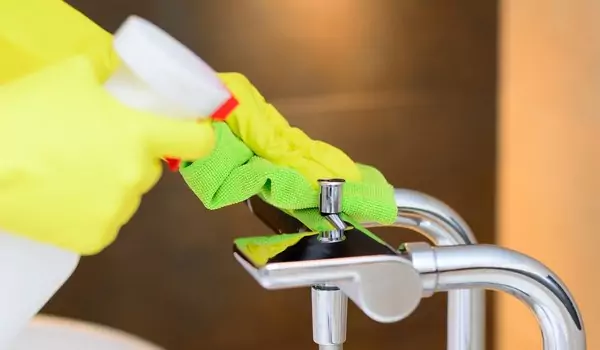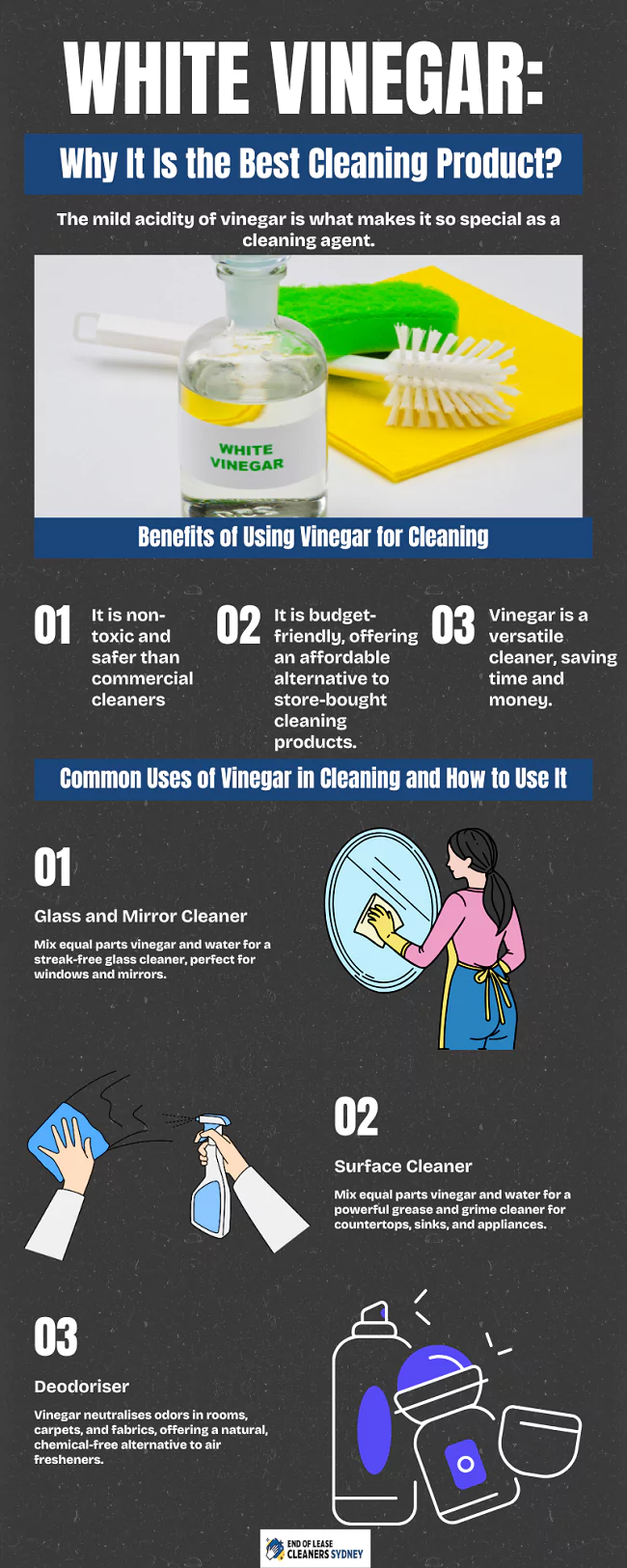Vinegar is a household staple that most people have in their kitchens. It has a great utility besides this known use; it is used as a great cleaning agent. This popular component is often touted as an eco-friendly and natural substitute for harsh chemicals.
But does it really live up to the hype when it comes to cleaning, especially for tasks like expert end of lease cleaning Sydney? With the current surge of people wanting environmentally friendly yet inexpensive products, it's no wonder many people are curious about using vinegar for cleaning purposes.
This blog explores vinegar as an effective cleaning product, its benefits, and how to use it for various cleaning tasks. It also covers the best ways to use vinegar for cleaning and when professional help might be needed. By the end, you’ll know why vinegar is the right choice for your cleaning tasks.
1. What Makes Vinegar a Potential Cleaning Product?

Vinegar is mostly composed of acetic acid, which gives vinegar its smell and natural, powerful cleaning properties. It is through acidity that the vinegar really cuts grime, dissolves mineral deposits, and eliminates harmful bacteria. Such properties contribute to why vinegar is a recommendation for countertops, glass, or even bathroom cleaning.
The mild acidity of vinegar is what makes it so special as a cleaning agent. It is not harsh on most surfaces, unlike some commercial cleaners that can damage or leave unhealthy residue on surfaces. Moreover, the natural composition of vinegar makes it biodegradable, making it a popular choice for those who prefer eco-friendly cleaning solutions.
2. Benefits of Using Vinegar for Cleaning
Vinegar has become popular because of several key advantages. For one, it is non-toxic, meaning it is safer than commercial cleaners that are known to contain a lot of hazardous chemicals. It is ideal for households with pets and children.
It is also budget-friendly, providing an affordable option for everyday cleaning compared to many store-bought products. In addition, vinegar is eco-friendly because it is biodegradable and free from harmful pollutants, which improves indoor air quality and reduces environmental impact.
Lastly, vinegar’s versatility makes it a multipurpose cleaner that can handle tasks like deodorising and polishing surfaces, helping save both time and money.
3. Common Uses of Vinegar in Cleaning and How to Use It
Vinegar is a versatile and natural cleaning agent that can handle a wide variety of tasks around the home. It’s a simple, effective, and eco-friendly solution for many common cleaning needs. Here are some of the most popular ways to use vinegar for cleaning:
- Glass and Mirror Cleaner: Vinegar, when mixed with water, creates a streak-free solution for cleaning glass surfaces. Combine equal parts vinegar and water in a spray bottle and use it to clean windows and mirrors for a sparkling finish.
- Surface Cleaner: Vinegar is excellent for cutting through grease and grime. To clean countertops, sinks, and appliances, mix one part vinegar with one part water in a spray bottle and wipe surfaces to remove dirt and stains.
- Deodoriser: Vinegar helps neutralise unpleasant odours in rooms, carpets, and fabrics. Place a bowl of vinegar in a room to freshen the air, or sprinkle it directly on carpets and upholstery to eliminate odours. It’s a natural and chemical-free alternative to artificial air fresheners.
- Descaling Appliances: For appliances like kettles, dishwashers, and coffee makers, vinegar is great at removing mineral deposits and limescale. Pour vinegar into the appliance, let it sit for a while, and then run the appliance to restore its efficiency and prolong its life.
These simple, everyday applications show how vinegar can be incorporated into your cleaning routine to tackle a variety of tasks with ease and effectiveness.
4. Limitations of Vinegar as a Cleaning Product
While vinegar is undoubtedly useful, it does have some limitations. Not all surfaces are suitable for vinegar-based cleaning. For example, vinegar can damage natural stone surfaces like granite, marble, or limestone. The acidity may dull the stone’s appearance and erode its surface.
Also, vinegar’s strong odour can be off-putting to some. Although the smell dissipates once it dries, it may not be ideal for people sensitive to strong scents.
For more specific tasks, vinegar may not always be the most effective cleaner. While it’s great for everyday grime, it may struggle with tough grease or stubborn stains, where a stronger cleaning agent would be necessary.
5. Can Vinegar Replace Professional Cleaning Services?
Vinegar is a reliable choice for everyday cleaning due to its affordability and versatility. However, for detailed tasks like end of lease cleaning in Sydney, professional services may be more effective. While vinegar is excellent for maintenance and minor cleaning, professionals bring specialised tools and techniques to ensure a deep and thorough clean.
White Vinegar: Why It Is the Best Cleaning Product?

Wrapping Up
Vinegar is an affordable, non-toxic, and versatile cleaning product that works well for many household tasks, from cleaning glass to removing odours. It’s a natural alternative to chemical cleaners and a great choice for regular cleaning. While professional help may be useful for tasks like end of lease cleaning Sydney, vinegar remains a reliable and eco-friendly option for everyday use.